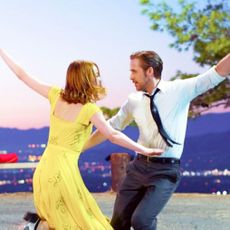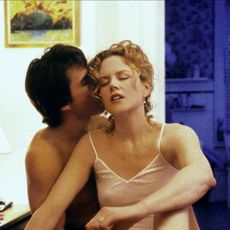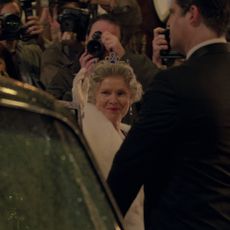
Lana Del Rey aka Lizzy Grant's definition of feminism: "a woman who feels free enough to do whatever she wants." The singer said this while expressing disinterest in feminism as a "concept" in a recent interview, which raised the usual concerns that her music perpetuates women as victims (half-true) and/or that she's eager to stir controversy (almost undeniable at this point, with song titles like "Money Power Glory" and "Fucked My Way Up to the Top"). But we cannot rely on Del Rey to be her own best critic. (This is, after all, the woman who claims without irony, "I don't think there's any shock value in my stuff.") She may not call herself a feminist or know much about the history of the movement, but her definition of a feminist — a woman who does what she desires, without limits — is radical, and one that she clearly follows in her work.
"Feminism" has in some ways outlived its usefulness as a label. The feminist artist and academic Holly Hughes once put it to me this way about her students, who were about the same age as Lana Del Rey at the time: "They live feminist lives whether they embrace that word or not." This is a historical shift more than anything else. Just as "liberal" was a dirty word before Obama became its poster boy in 2008, "feminist" fell out of favor after second-wave feminism and the infighting that it produced. It's entirely possible to fight for equal gender rights and feel stigmatized by the word "feminist."
Nonetheless, Lana Del Rey's new album out this week, Ultraviolence, is feminist because it achieves what no other woman has at this moment. It is a roots album by a major pop star, produced by the Black Keys' Dan Auerbach, and recorded live, with a seven-piece band. It is languid, without any huge bass-building choruses (the lead single, "West Coast," actually slows down the tempo for the chorus). It's downright old-fashioned, Del Rey's sound finally catching up with the sixties Americana imagery she's peddled from the beginning. And it will sell millions worldwide, at a time when doing so without a legitimate hit single is nearly unthinkable.
But Ultraviolence is a work of feminism for another reason. Del Rey writes and sings about women who hook up with dangerous and abusive men, and who enjoy it. For this critics have called Del Rey "anti-feminist." But by that curiously conservative logic, feminists should only make songs about empowered women, as just about all charting divas today like Katy Perry and Lady Gaga already do, or else shame those who aren't. This line of thinking isn't just conservative, it's anti-art. It assumes that feminist musicians must prescribe to women how to live, rather than express their many realities. (This same kind of narrow-mindedness, coincidentally or not, drove the anti-porn wing of second-wave feminism in the eighties, which helped kill the word "feminist.") Del Rey gives voice to women living in grim circumstances, who don't necessarily know what they want or what's good for them — and she does so in fantastical ways.
"Many college boys have embraced Jim Morrison as their tragic icon, a man who flew into the arms of death looking for ecstasy. Del Rey is asking a new generation to do the same for her."
There's a double standard at work here. No one would bat an eye if Jack White or Kanye West or Trent Reznor revealed that they have a masochistic side. We damn near expect it from those brooding rock and hip-hop gods. But Del Rey's pronouncement "I wish I was dead already" shocked exactly because young, pretty, rich women aren't supposed to want to die. This death wish is all over Ultraviolence, and what makes it so subversive where in other hands it might've been old-hat. Many college boys have embraced Jim Morrison as their tragic icon, a man who flew into the arms of death looking for ecstasy. Del Rey is asking a new generation to do the same for her.
Take the most provocative song on Ultraviolence, its title track. It's ostensibly about a woman who's physically hurt by a man but can't help but love him. She quotes the sixties girl-group song "He Hit Me (It Felt Like a Kiss)," co-written by Carole King. But Del Rey goes a step further than King, suggesting that the man is attempting to save the woman, who's "filled with poison." You can also read "Ultraviolence" as a metaphor for addiction, with "Jim" as her whiskey bottle or smack. Either way, it's a painful, powerful, multilayered song about what it means to be in an unhealthy relationship. It's hard to imagine Rihanna penning that.
Stay In The Know
Marie Claire email subscribers get intel on fashion and beauty trends, hot-off-the-press celebrity news, and more. Sign up here.
Ultraviolence is populated by Del Rey's usual tropes, the femme fatales, tight red dresses, women "on the side," drifters who latch on and then disappear. But Del Rey is at least self-conscious about her tics this time around. The viciously smart "Brooklyn Baby" parodies the music snobs who once wrote her off as contrived, packaged by label execs ("My jazz collection's rare" she warbles in her highest register), but it also aligns with people who believe in honest music, against the cynicism of media that reduce Lana Del Rey to easy headlines: "You never liked the way I said it/If you don't get it, then forget it/So I don't have to fucking explain it." It's become abundantly clear that Del Rey does not need to convince her haters anyway. Her fans' adoration has been likened to the heyday of Beatlemania.
Instead of retreating from the difficult subject matter that got her pegged as "anti-feminist," Lana Del Rey has doubled down on it. She has created an album both more gorgeous and more uncomfortable than anyone could've expected. And she will be worshipped for it for many years to come. She has taken listeners to the places you're not supposed to go, which is exactly where Lana Del Rey likes to be. She's a feminist. She does whatever the fuck she wants.
Related:
Lana Del Rey: 'Feminism Is Not An Interesting Concept'
Watch Lana Del Rey's New Video for 'Shades of Cool'
Lana Del Rey Performed at the Kimye Wedding FOR FREE
Lana Del Rey Was Supposed to Record With Lou Reed The Day He Died
Via
Paul Schrodt is a freelance writer and editor who also contributes to Esquire, GQ, Money, The Wall Street Journal, and more.
-
 Celebrate Earth Month With Our Feel-Good Fashion Report
Celebrate Earth Month With Our Feel-Good Fashion ReportYour guide to being more sustainable in 2024.
By Anneliese Henderson Published
-
 Anne Hathaway Details the "Gross" Audition Request She Once Endured
Anne Hathaway Details the "Gross" Audition Request She Once Endured"Now we know better."
By Meghan De Maria Published
-
 The Emotional Ending of 'Baby Reindeer,' Explained
The Emotional Ending of 'Baby Reindeer,' ExplainedNetflix's latest miniseries from Richard Gadd is based on the true story of the comedian and his stalker.
By Quinci LeGardye Published
-
 The Best Bollywood Movies of 2023 (So Far)
The Best Bollywood Movies of 2023 (So Far)Including one that just might fill the Riverdale-shaped hole in your heart.
By Andrea Park Published
-
 ‘Bachelor in Paradise’ 2023: Everything We Know
‘Bachelor in Paradise’ 2023: Everything We KnowCue up Mike Reno and Ann Wilson’s “Almost Paradise."
By Andrea Park Last updated
-
 Who Is Gerry Turner, the ‘Golden Bachelor’?
Who Is Gerry Turner, the ‘Golden Bachelor’?The Indiana native is the first senior citizen to join Bachelor Nation.
By Andrea Park Last updated
-
 ‘Virgin River’ Season 6: Everything We Know
‘Virgin River’ Season 6: Everything We KnowHere's everything we know on the upcoming episodes.
By Andrea Park Last updated
-
 The 60 Best Musical Movies of All Time
The 60 Best Musical Movies of All TimeAll the dance numbers! All the show tunes!
By Amanda Mitchell Last updated
-
 'Ginny & Georgia' Season 2: Everything We Know
'Ginny & Georgia' Season 2: Everything We KnowNetflix owes us answers after that ending.
By Zoe Guy Last updated
-
 35 Nude Movies With Porn-Level Nudity
35 Nude Movies With Porn-Level NudityLots of steamy nudity ahead.
By Kayleigh Roberts Last updated
-
 The Cast of 'The Crown' Season 5: Your Guide
The Cast of 'The Crown' Season 5: Your GuideThe Mountbatten-Windsors have been recast—again.
By Andrea Park Published